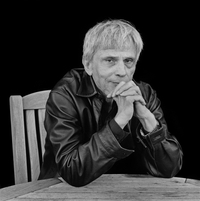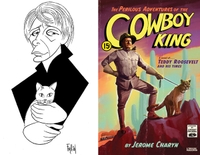Charyn's been busy in recent months, publishing a biographical study of Isaac Babel (Savage Shorthand
) and editing an anthology of Jewish-American literature (Inside the Hornet's Head
). But that doesn't excuse the rushed quality of this cut-and-paste rehash. It's an ill-timed release, considering Tarantino's two Kill Bill
movies may have reintroduced him to the public spotlight after a long absence, but they did so at a cult-hero level significantly below the iconic status he enjoyed after making Pulp Fiction
. Accordingly, everything seems to be done at half-strength: Charyn relies heavily on quotes from earlier profiles and film reviews, and in several cases, his analysis barely rises above quoting dialogue line by line. He also leans on the critical notion that actors can be confused with the characters they're playing, an idea that goes hand in hand with his reduction of Tarantino's themes to the psychological plight of "perplexed, parentless children" who are as scarred by the absence of their fathers as Charyn presumes Tarantino himself must have been. It's clear Charyn has been moved by Tarantino's films, but this expression of his admiration falls far below his usual lyrical standards as a novelist. (June 10)



